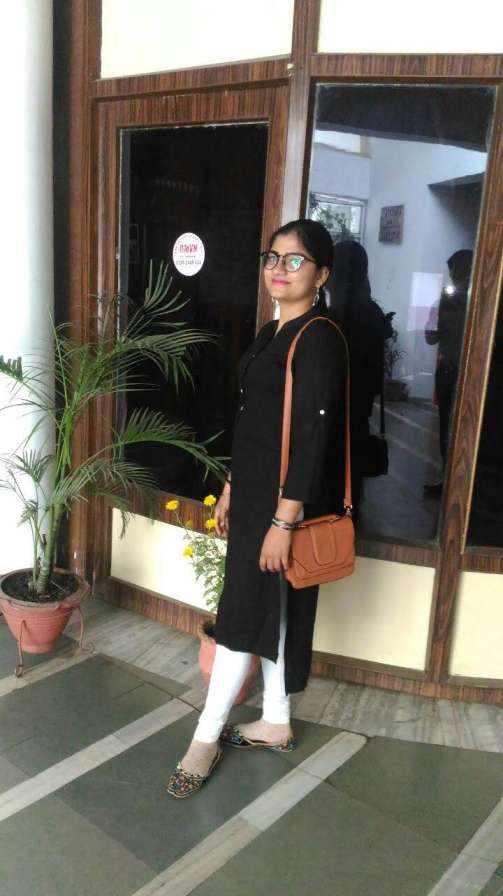I have been working as a student relationship manager (SRM) since 2018, at Medha, a nonprofit that helps young people start careers they enjoy. I have lived in Varanasi all my life; I did my schooling, graduation, and post-graduation here and now I work here too.
As an SRM, my primary responsibility is training students through our skill development programmes. Apart from this, I also regularly interact with the administrative staff of various colleges and universities in Varanasi. And since we connect our students to career opportunities, I also interact with industry experts and employers.
I was always on the move—meeting students, organising sessions for them, connecting them to potential employers, and so on.
Before the pandemic and the lockdown, I was always on the move—meeting students, organising sessions for them, connecting them to potential employers, and so on. However, in the past few months, everything has changed and my work is now completely virtual. It was a difficult transition to make, for my students, employers, and even for me. We did not have much of a choice but to power on, and now all of us have become comfortable with this new norm.
6 AM: Since the lockdown began, I have started waking up early. As soon as I wake up, I go to the terrace and water my plants. I also spend some time skipping. On days when I don’t feel like skipping, I put on some Punjabi songs and dance—anything to get moving and begin my day.
9 AM: After preparing and eating breakfast, I enter my room with a hot cup of tea and start my day of work. Initially, students had a tough time adjusting to the shift to virtual platforms. Earlier, students who were interested in joining Medha’s courses would register for it at their colleges and if there were any issues, I would help them then and there. Now that everything is online, I have to coach them at every step, be it for registration, online payment, or even using video platforms.
So, usually in the morning I chalk out time to go through such issues and doubts, and answer my emails and messages. After this, I check in with my area manager with my plans for the day. Twenty minutes before my first session begins, I review the activity that I have planned. Today, I have asked my students to bring a newspaper to the session.
11 AM: Each session lasts for 60-90 minutes. Over the last few months, our students have learnt how to use Microsoft Teams, which is a different platform from the ones they use for their other classes. I spend the first few sessions of every batch familiarising my students with the platform. This makes it easier for them to interact and make the most of the sessions later on.

Slowly, I gained confidence, and realised that I was also learning a lot from listening to and engaging with my students. | Picture courtesy: Sonali Singh
For today’s activity, I divide all the students into four groups—black, blue, red, and green. I ask each group to make boats of the same size using newspapers, click pictures, create a collage, and share it with everyone else. The team which makes the maximum number of boats, within forty minutes, is declared the winning team. The idea behind this activity is to see which of the students step up and take charge. It gives them the opportunity to learn about how to lead a team and how to manage tasks within a stipulated time frame.
At the end of the activity, there is a discussion among all groups about what worked, what did not, why the winning team was better, and so on. This is very important as it provides a learning experience for the students. I always use myself as an example while talking about confidence and the need to take initiative.
I was terrified and unsure about whether my students were grasping any of the information I was providing them with.
When I first joined Medha, despite the training and inputs I was provided with to take sessions with students, I had no idea what I was actually supposed to do. I was terrified and unsure about whether my students were grasping any of the information I was providing them with. Initially, I just followed the instructions given to me and did not experiment or try anything new on my own. Slowly, I gained confidence, and realised that I was also learning a lot from listening to and engaging with my students. It was through this process that I gained insights and experiences that have greatly helped me and that I now use in my sessions.
12.30 PM: My next session for the day begins immediately after the first one ends. For this set of students, I have planned a session to help them understand how to use LinkedIn and other platforms to explore career opportunities. Once again, I divide the batch into teams of three and ask them to explore work-from-home opportunities by simply searching on Google and spending some time on LinkedIn.
I always tell my students to use their free time, even if it is just twenty minutes, to use Google to explore opportunities. This helps them realise that there are many opportunities and vacancies out there and that the employment scenario is not as bleak as they think it is. After they identify some opportunities, I conduct one of my favourite activities—mock interviews. During the mock interviews, I ask my students about their hobbies and ask them to elaborate on various aspects of their resumes. This exercise is a great way for students to be more careful of what they let out in conversations during interviews. This is because interviewers ask questions from the conversation itself and not just from their resume.
3 PM: After having a quick lunch and a cup of tea, I go back to my room to resume working on a quarterly report that is due soon. Before the pandemic, we used to go and meet the principals, vice-chancellors, and other heads at the college campuses we work at, to update them about our programmes. Since that is now difficult, we send them quarterly reports with information on the activities that we have conducted for each batch of students, and the number of students who have secured internships, job offers, and other opportunities.
Once I complete the report, I get on a scheduled call with a person who works at Tata Consultancy Services (TCS). He has agreed to conduct an interactive session for our students where he will answer any questions related to the placement process, work-from-home opportunities, and so on. We organise such talks so that our students get acquainted with people from the industry, their experiences, and learn more about the process of being employed in a certain company or role.
5 PM: The lockdown period has led to most of us SRMs coming up with innovative and out-of-the-box initiatives and ideas for our students and sessions. SRMs are spread out across Uttar Pradesh, Bihar, and Haryana and since we have not been able to meet and interact with each other as frequently during the lockdown, we have come up with the idea of creating a talk-show for all the SRMs. We are calling it ‘Spotlight’.
We have been eagerly planning and discussing this and the talk-show should go live by December.
The plan is to put the ‘spotlight’ on one SRM in each episode and give them the opportunity to talk about new initiatives or ideas that they have implemented with their students. This helps facilitate conversations and allows the other SRMs to learn from and implement these ideas with their students. We have been eagerly planning and discussing this and the talk-show should go live by December. I get on a call with some of my fellow SRMs to finalise the logistics and go over some last-minute planning related to the format of show.
6 PM: I head back to the terrace. Here, while walking, I respond to any queries or doubts from my students about the opportunities that have been shared with them. I try to respond to them via messages but if it is something a bit trickier, I get on a call with them. Around this time, I also receive messages from various companies and organisations about internship or employment opportunities, which I forward to my students.
Once I am done with all of this, I freshen up and help prepare dinner. After eating dinner with my parents, I head back to my room and get on our SRM group. This group chat is a great place for all of us to discuss any problems or issues that we face in our daily operations. All of us chip in and help solve the issues and provide insights or tips on how to tackle the situation. We also use it as a space to discuss any new ideas and initiatives we might have. Once that is done, I like to watch videos on YouTube before I fall asleep.
As told to IDR.
—
Know more
- Explore tools and resources on employability, education, and how to strengthen youth programmes.





